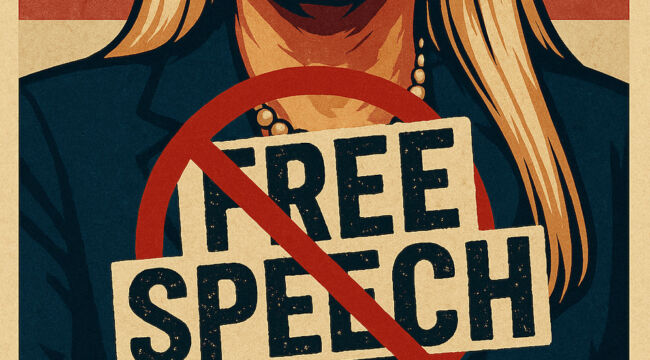Legally Bondi
U.S. Attorney General Pam Bondi is easily President Donald J. Trump’s worst appointment.
I honestly don’t know how he could get it so wrong. Bondi has done nothing worthy of note, other than saying she’s going to do something of note. No Epstein files. No disclosure of her lobbying work was made during the confirmation process. And now this, perhaps the most disgraceful of all.
Hey, Pam! The United States of America doesn’t do “hate speech.”
Why not? Because there is no such thing, thanks to the First Amendment. Europeans had to invent that nonsense and, unfortunately, codify it into law, to silence opposition to population replacement.
If you’re wondering why your European friends don’t understand why you keep saying, “There’s no such thing as ‘hate speech,’” this is why.
But before I get into Legally Bondi and her silly assertion, let’s make a few things clear:
Free speech matters.
So does protecting your company’s reputation.
And no, calling something “hate speech” doesn’t magically erase the First Amendment — despite what the U.S. AG seems to think.
We’ve somehow landed in a cultural clown show where defending open expression gets you labeled an extremist, while clamping down on every spicy opinion earns you a corporate virtue badge. Neither side is right. And both are dangerous.
Here’s the grown-up take — and why Bondi’s new obsession with “hate speech” is making things worse, not better.
Free Speech Is the Engine of Innovation
Let’s start where every sane person should: free speech is the oxygen of open societies and dynamic companies.
It’s how bad ideas get stress-tested, good ideas get refined, and breakthroughs happen. A culture that can’t handle disagreement can’t handle progress either.
If employees fear getting fired for questioning management, or if clients fear blacklisting for voicing unpopular but lawful opinions, you get conformity — not creativity. That’s death for innovation.
So yes, companies should welcome dissent. They should encourage constructive criticism. They should even tolerate a bit of colorful argument.
But there’s a catch…
Companies Aren’t Public Squares — They’re Risk Engines
A business isn’t a government. The First Amendment restrains state censorship, not corporate judgment.
And companies can’t just shrug if their brand is getting set on fire by rogue employees, clients, or users.
If someone is defaming customers, harassing coworkers, or spouting genuinely discriminatory bile while representing the company, that’s not “brave speech.” That’s brand sabotage.
And yes, even if you’re on social media in your free time while employed at a company, you’re a reflection of that company or organization. That’s one of the actual costs of having a J.O.B.
Take that numbnut President-Elect of the Oxford Union who cheered Charlie Kirk’s assassination. Does he have the right to spout such bile? Yes. Should the Oxford Union kick him out? Also, yes.
Why? Because the Oxford Union is losing guests left, right, and center. My friend and colleague, James Altucher, just refused an invitation to debate there. The Union’s centuries-old reputation lies in tatters. And as the imbecile published his high school grades on his LinkedIn profile, we know they weren’t good enough to get into Oxford’s unjustifiably vaunted Politics, Philosophy, and Economics, or PPE, program. In other words, he was a DEI entrant, like Joy Reid was at Harvard. It shows.
Protecting the company, organization, or firm from reputational harm isn’t censorship — it’s survival.
Why Bondi’s “Hate Speech” Gambit Misses the Point
Here’s where Pam Bondi and her self-styled crusade against “hate speech” go entirely off the rails.
Bondi has claimed that companies must crack down on all “hate speech,” but never actually defines what that is. That’s the fatal flaw.
There is no legal category called “hate speech” in U.S. law. None. Zero. Zip. Nada. And thank God for that!
The Supreme Court has ruled — in cases like Brandenburg v. Ohio and Snyder v. Phelps — that speech cannot be banned simply because it is offensive, unpopular, or upsetting. It must cross purposely narrow lines: incitement to violence, defamation, actual threats, or direct harassment.
Bondi’s approach would turn companies into speech police, punishing employees not for causing harm, but for expressing disfavored opinions — which is the exact opposite of what free societies are built on.
It’s not “hate” to criticize government policy, question ESG dogma, or challenge sacred corporate cows. It’s called critical thinking. If you smother that, you smother the intellectual spark that makes companies competitive.
Not to mention, to quote from my colleague Dave Gonigam over at 5 Bullets, “voters swept Donald Trump back into the White House last fall — in part on a wave of revulsion against Democrats’ relentless attacks on free speech.”
Starting in 2018, Dave has regularly chronicled the rise of what’s now known as the “censorship industrial complex.”
But that’s supposed to be all over now, right?
As Trump said to a joint session of Congress in March, ”I have stopped all government censorship and brought back free speech in America.”
Hardly.
The Smarter Way: Clear Rules, Not Censorship Mobs
Rather than flailing around with vague bans on “hate,” companies should adopt clear, narrowly defined policies about what speech crosses the line:
- Define it: Incitement, defamation, targeted harassment, and discrimination that creates a hostile work environment — not mere disagreement.
- Be consistent: Apply the rules evenly, regardless of viewpoint or politics.
- Be proportionate: Escalate discipline based on intent and impact, not the level of online outrage.
- Be transparent: Publish the rules so people know what they can and can’t do before someone gets publicly flogged.
This model borrows from the “breathing space” principle in free speech law: allow wide expression, carve out narrow exceptions for genuine harm. That’s how you protect your brand and your culture.
Free Expression + Corporate Self-Preservation
We need to stop pretending these values are mutually exclusive.
Companies absolutely should guard their reputations. They absolutely should refuse to tolerate harassment or bigotry. And they absolutely should not nuke someone’s career over unpopular but lawful opinions.
Bondi’s fuzzy “hate speech” approach would invite chaos, witch hunts, and lawsuits, while doing nothing to stop actual misconduct.
Clarity beats cancel culture. Every time.
The Bottom Line
You can champion free speech and defend corporate reputations. In fact, you must.
- The Constitution protects you from government censors, not your boss.
- Your words carry weight… and consequences.
- But punishment should be reserved for real harm, not mere disagreement.
That’s not weakness. That’s how civilizations — and companies — survive without turning into either totalitarian speech prisons or lawless Twitter brawls.
Free speech isn’t a free-for-all. But it isn’t a thought crime, either.
I’m thrilled MAGA has reminded Pam Bondi of that.



Comments: